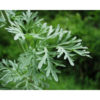Description
Wormwood is known to be very bitter in taste, second only to rue, which inspired the Ancients to have a saying ‘as bitter as wormwood’. In traditional folklore, wormwood was seen to be an old love charm when combined with marigold, thyme and marjoram. The Ancients also said that wormwood counteracted the effects of hemlock and toadstool poisoning, as well as the ‘biting of the sea dragon’.
The bitter components and acids render wormwood an excellent remedy for digestive issues. This is primarily because the bitter constituents cause the gallbladder to produce and release bile. It is also noted as being useful in alleviating fever, expelling parasitic worms like roundworm from the digestive tract, and for its tonic effects.
It may also be applied topically to reduce inflammation of insect bites and promote healing. Wormwood is also noted to be useful in treating jaundice, a sign of liver dysfunction and to increase sexual desire.
Texts written 2 thousand years ago in China describe how to use Wormwood to treat Malaria and in recent years one of the active ingredients of Wormwood, Artemesinin, has indeed been shown to be a staunch ally against this dreadful disease.
Malaria kills over a million people a year, most of them children and especially in Africa. In 2004 the Ethiopian government changed their front line Malaria drug from Fansidar, which had an average treatment failure of 36% to Coartem, a drug based on Artemesisin, which is 100% effective when used correctly



